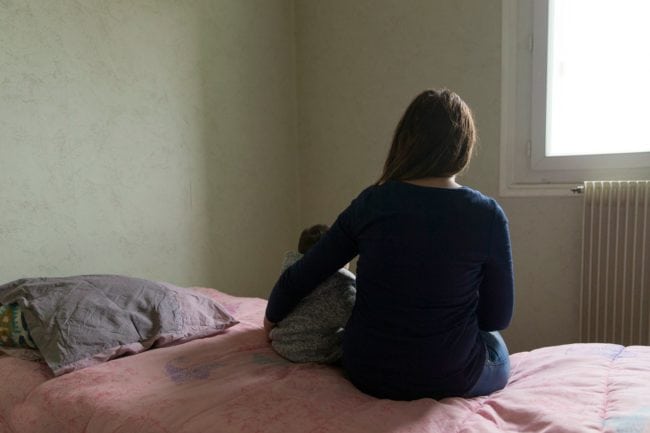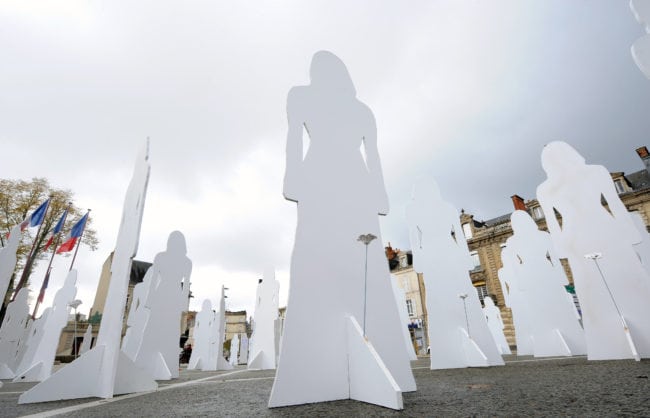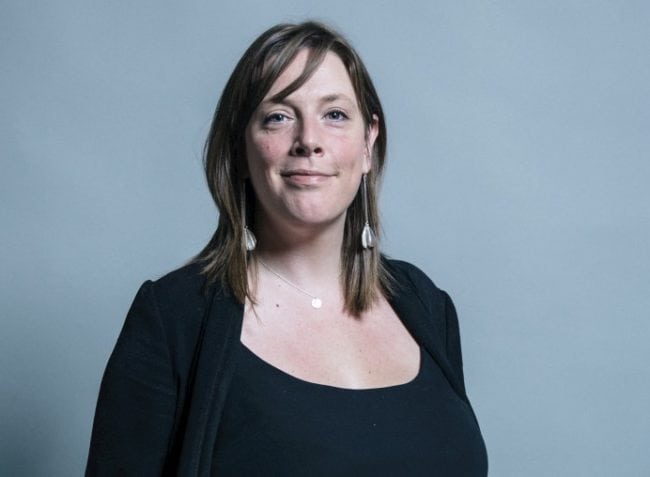Domestic violence shelters: Gender recognition changes ‘would have no impact’ on services

A detailed study of women’s domestic violence shelters has found that many are already trans-inclusive, and that proposed legal reforms will not impact their services.
The government has proposed changes to the Gender Recognition Act to allow transgender people to more easily gain legal recognition as their preferred gender.
Self-identified ‘Gender Critical feminist’ voices in mainstream media outlets have repeatedly claimed the changes would made women-only spaces unsafe for women.
But a report into experiences of women’s domestic violence services this week has underlined that those actually providing services to women do not have significant concerns about the law, and many are already inclusive of trans women.

File photo. A mother and her child in a domestic violence shelter (GEOFFROY VAN DER HASSELT/AFP/Getty )
The research, conducted by nfpSynergy and commissioned by Stonewall, is based on in-depth interviews with representatives from 15 local domestic and sexual violence support services across Britain.
The report states: “[The research] found that domestic and sexual violence services in England and Wales have been supporting trans women in their single-sex women-only services for some time.
“Participants take a personalised, client-centred approach to supporting trans women, as they do for all survivors. Many described steps they are taking to proactively deliver trans-inclusive services, including creating specific policies and delivering staff training.
“Participants said that many staff and member services have responded positively to discussions about supporting trans women. Most recalled positive experiences of trans women accessing their services and where other service users have been supportive.”

File photo. Silhouettes representing women victims of violence (JEAN-FRANCOIS MONIER/AFP/Getty)
It adds: “Recalling instances where challenges have arisen, services described how they engaged with staff and service users to build understanding for trans survivors and ensure that a safe and inclusive space was maintained for all.
“Many participants told us that reform of the Gender Recognition Act would have no relevance to how they deliver their services.
“While respondents were aware of a view that gender recognition reform could allow violent men to pose as women to access their services, with one participant expressing a concern about this, there was otherwise a clear consensus that services’ thorough risk assessment procedures would safeguard against this.
“These participants said that gender recognition reform would not compromise their ability to protect their service against, or turn away, any abusive or disruptive individual.”
The report continues: “Participants said that funding cuts are the main threat facing their services and called for increased funding for all services, including women-only services, specialist services for LGBT survivors and services for BAME women.”
Suzanne Jacob OBE, Chief Executive of SafeLives, said: “This report showcases much needed evidence from frontline practitioners about how trans victims and survivors of domestic abuse and sexual violence can access services now and in the future.
“Ensuring there is dedicated provision which recognises the severity of abuse that trans survivors face in an inclusive and responsive way must therefore be a priority for both national and local government.
“Everyone experiencing domestic abuse deserves to be believed and supported – whoever they are, wherever they live. We hope the voices and experience of trans survivors guide the reform of the Gender Recognition Act, alongside those expert domestic abuse professionals who have been supporting survivors without discrimination or hesitation for decades.”
Estelle du Boulay, Director at Rights for Women, said: “Domestic abuse and sexual violence are gendered issues and require support services that respond effectively to this reality. Women have worked and campaigned together in solidarity for many decades to protect women-only support services for survivors of abuse and keep women’s voices at the centre of what they do.
“As a women-only organisation that campaigns for increased legal rights and equality for women, we support self-determination and seek to be fully trans-inclusive. We welcome this report, which looks at experiences of a broad range of frontline women’s organisations across the country in relation to the support they offer transwomen.
“It shows how these vital services are responding to become more inclusive whilst continuing to uphold a safe space for all that need their services. We recognise how important it is to hear their voices in this debate.”
Labour MP Jess Phillips, who previously worked in domestic violence services, said: “We need to remember that it is trans people who will benefit from the reform of the Gender Recognition Act. Of course, there needs to be discussion and that needs to be conducted in a way that is considered and civil. The public conversation has been the exact opposite.
“Stonewall and nfpSynergy’s report shows why it’s so important that we hear from women’s refuges and rape crisis centres, who assess the needs of the vulnerable women in their care day in, day out. In this report, they’ve shared their experiences of supporting trans women. And they talk about the ways in which all survivors need personalised support.
“I hope that, throughout the consultation process, we continue to listen to each other and place our trust in the experts.”

Jess Phillips
The Rt Hon Maria Miller MP (Conservative), Chair of the Women and Equalities Select Committee said: “In 2016, I was proud to lead the Women and Equalities Select Committee’s inquiry into transgender equality. Alongside fundamental changes within our healthcare, education and criminal justice systems, we concluded that reform of the Gender Recognition Act 2004 is urgently needed.
“But while there is cross-party support for trans equality, misinformation is holding back progress.
“That’s why Stonewall and nfpSynergy’s report is so important. It provides a clear, balanced account of the provision of women-only services to trans survivors. It shows us that many services already support trans women on the basis of self-identification; streamlining the legal system of gender recognition will not have an impact on the way they are able to operate.
“As the public consultation progresses, I hope that reports such as this will be used to inform an evidence-based conversation, where everyone can be heard and treated with dignity and respect.”
Baroness Burt of Solihull, Liberal Democrat Spokesperson for Women, said: “The Gender Recognition Act is in urgent need of reform. The changes we want to see introduced will simply make it easier for trans people to have their gender legally recognised. But we’ve seen a wave of attacks from a vocal minority in the media and online portraying these proposed changes as a threat. One often cited fear is what will happen to domestic and sexual violence services.
“This report shines a light on the experiences of professionals whose voices have been largely missing. Opponents of reform portray scenarios that are very different from reality. It is therefore crucial we listen to services providers and hear about what is actually happening. It’s clear that their efforts to progress trans inclusion are an integral part of their work to make their services inclusive for all women.
“Through working collaboratively, we can end this damaging speculation, and focus on building a society where all marginalised women are treated with dignity and respect.”

